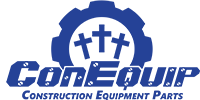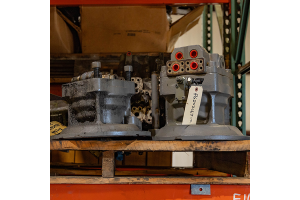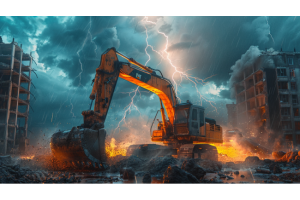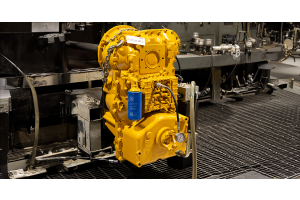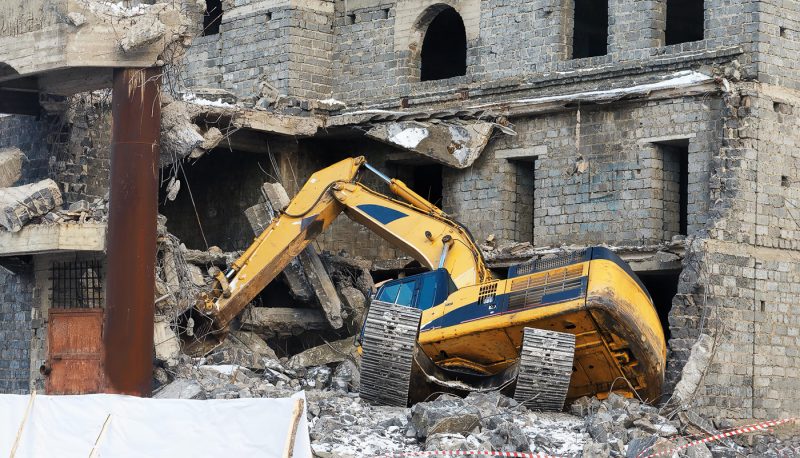
We have shared blogs on worksite safety before, but it's aways good to circle around back to the subject of safety especially when work starts to increase during the summer months.
When working with machines such as bulldozers, excavators, wheel loaders and other pieces of equipment it's easy to forget these machines weigh thousands of pounds. One mistake can be deadly. Heavy equipment failure or misuse is one of the top 10 causes of workplace fatalities, according to OSHA. More than 400 people in America die each year in heavy equipment accidents. While that may not seem like a big number considering how many people are working on job sites across the country on any given day, just ask the families of those who tragically lost a loved one if that number seems high to them.
Here are some tips that you can use when operating heavy machinery, working to repair machines, or managing crews on a worksite.
1. Training
It is easy and tempting to allow someone to operate a machine even if they aren't certified. Swinging an excavator cab, lifting something with a forklift, or backing up a wheel loader isn't really difficult. All that is required is the press of a button or the simple pull of a lever. This is where a number of accidents happen, with inexperienced operators. Anyone who operates a machine needs to be certified to use that machine, even if they're only doing something simple like starting it to get it warmed up for the person who will eventually start using it. Never allow an untrained operator into the cab of heavy equipment.
Make sure all certified operators know how the machine works, what they need to do in emergencies, and have knowledge of proper safety steps they need to take while operating the equipment.
Review of safety procedures is never a waste of time, even with seasoned veterans. You may get a lot of eyes rolling as you go over the basics, but that's a lot better than losing a life. You should consider holding safety training sessions for equipment operators at least once a month. Your operators probably will never admit it but there are definite times during these training sessions they think to themselves how they forgot about something you mention about safety.
2. Inspect Machines Before Operation
Regular safety inspections is a very easy step that's often skipped before operation. If a machine has been damaged, it can be unsafe to operate. Often you won't know there's a problem until it's too late. If a critical component fails while in use, it can lead to serious injury or worse.
Operators need to check fluid levels, brakes, ladders, tires, anything a visible inspection will reveal something that has been compromised or not ready for use.
Regular maintenance is super important. Follow the service schedule, check the owner's manual for details. When equipment needs to be serviced, be sure someone experienced does the work.
3. Don’t Rush
You might be saying to yourself, most of my operators don't have a problem with this tip! This is when going slow is to your advantage.
It's tempting to skip important steps and hurry when you are facing a deadline. However, skipping a safety step will probably only save a few minutes. How much more time will be wasted if you need to shutdown a worksite because someone has been hurt or killed because an important safety step was skipped? In fact, rushing, particularly when operating heavy equipment, will result in errors and mistakes that will cost you more time.
4. Communication is the Key
Be sure all workers in the area know when a vehicle is occupied and in operation. A construction foreman and spotters are vital to keep the danger areas around a vehicle clear. Everyone should understand what their responsibilities are. Have clear and comprehensive safety guidelines, procedures and policies.
5. Minimize Distractions
Probably one of the biggest causes of accidents is distractions. When your operator isn't focused on what he is doing, things will be missed such as obstacles, hazards, and people. One of the biggest distractions is the same one you see everywhere on the roads as you drive your car, cell phones. A policy restricting phones from worksites is a good idea. This is so important, OSHA requires employers to have policies against distracted driving, with penalties as much as $100,000 or more. By law, phones cannot be used on a crane or derrick.
6. Worksite Hazards
Worksite hazards are everywhere. It is up to everyone on your construction site to be sure those hazards are minimized or eliminated if possible. Those hazards include things like power lines, uneven ground, ditches, structures, and anything else your machine could engage. Doing a walk-around before work commences is important to identify these potential hazards.
Common sense coupled with following all safety procedures will go a long way in keeping everybody in your company safe.


